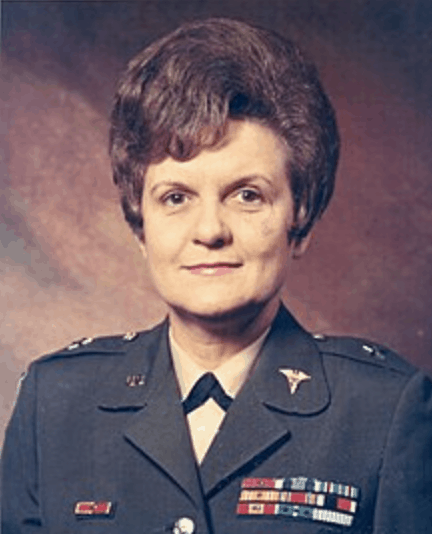When Anna Mae Hays was born, it would be another six months before a woman’s right to vote was enshrined in the Constitution. Her lifespan, over the next 98 years, is a parable of the roads women traveled during the century following the Nineteenth Amendment.
Hays was an accomplished musician who wanted to study at Juilliard, but her family could not afford this extravagance, so she pursued one of the few professions open to women at the time: nursing. When the United States joined World War II, she enlisted as a nurse, one of the few ways a woman could serve as a military officer. Her term of office, as of other women, was for the duration of the war plus six months.
During two and one-half of those years she served in Ledo, Assam, Indian. In that time her hospital, situated at the beginning of the Burma Road, treated more than 49,000 patients. She was promoted to First Lieutenant and remained on active duty after the war, once again an opportunity possible only because she was a nurse.
At Fort Dix, New Jersey, she was an operating room supervisor and later head nurse of several wards. Her days were usually twelve hours long, six days a week. She was surprised one day when she was summoned to the office and promoted to captain.
Hoping that she could finally further her education, she planned to attend Columbia University. The Korean War, however, killed that notion, when she was assigned to serve overseas. She participated in the landing at Inchon and worked in a field hospital where they served 25,000 patients in only ten months. As the Chinese and North Koreans began overrunning the area, a rapid evacuation occurred. “I can remember traveling south from Inchon to Taegu by train in the middle of the night,” she said later, “not knowing when a railroad trestle over which we traveled would be blown up.”
After several other assignments, one of which was caring for President Eisenhower during a stay at Walter Reed Hospital, she finally had the opportunity to earn her bachelor’s degree at Columbia University Teachers College. She was 38, like many women of non-traditional age who earned degrees during the twentieth century. She would later earn a master’s degree.
Hays married, but her husband died after six years. He was gone by the time, as a full Colonel and head of the Army Nurse Corps, she went to Vietnam to assess the need for nurses in the Southeast Asian conflict.
Hays was promoted to Brigadier General in 1970, the First Woman in any branch of the service to reach this rank. General William Westmoreland, former commander in Vietnam, was present when she received her star. Later Westmoreland’s wife said to Hays, “I wish you would get married again. . .I want some man to learn what it’s like to be married to a general.”
Like many women leaders during her lifetime, Hays worked long hours and was diligent in supporting women. She advocated to get them promoted, to place them in prominent places, to strengthen their qualifications, to allow them to remain on duty while they were pregnant and had children, and to assure their spouses received the same benefits as those of men.
Both the advances and disappointments of women’s journey are present in the history of Anna Mae Hay’s life. Today we can celebrate that there are 69 general officers in the Army, Navy, Marines, and Air Force, but we must also recognize the work yet to be accomplished. Women comprise only 10% of the total number of general officers.

